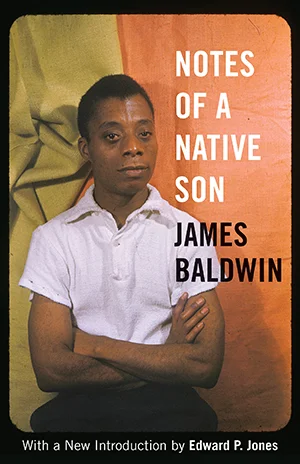James Baldwin
James Baldwin (1924-1987) somehow managed to live most of his adult life in France (from age 24 until his death at 63) and yet became an essential voice of the 20th Century American experience. He seemed to master the living of something — playwriting, preaching, short story writing, novel writing, public speaking — and then to perfect it from a distance of the living. His level gaze, his deliberation of speech, his precise articulation all bestowed an air of authority and of wisdom that a passionate age had in short supply. His prose style is striking in its smooth power, its fluidity, and its threat or promise of an ambush of revelation. He was self-taught, never went to university, and found his deep well of influence in his reading.
He was born in Harlem, New York City. He never knew his father, but in an ambivalent way his step-father, a Baptist preacher, was a profound influence, as was his strong mother. In middle school he had the good fortune of having Harlem Renaissance novelist and poet Countee Cullen as a mentor. When he was attending the Dewitt Clinton High School in the Bronx he became a junior minister/boy preacher at the Fireside Pentacostal Assembly. He wrote and wrote and wrote during his teen years and read ten or a hundred times beyond what he wrote.
Too young for WWII, he left for France when he was 24 and, despite many trips back to the US and active involvement in the great social issues of the day, he essentially lived the expatriate life. His roll of friends is staggering: Malcolm X, Harry Belafonte, Sidney Poitier, Nina Simone, Josephine Baker, Miles Davis, Ray Charles, Yves Montand, and Marguerite Yourcenar, among many others. He was a magnet, an engine for mid-century cultural life across borders around the world. He died of stomach cancer much, much too young.
Notes of a Native Son
Notes of a Native Son
A new edition of the book many have called James Baldwin’s most influential work
Written during the 1940s and early 1950s, when Baldwin was only in his twenties, the essays collected in Notes of a Native Son capture a view of black life and black thought at the dawn of the civil rights movement and as the movement slowly gained strength through the words of one of the most captivating essayists and foremost intellectuals of that era. Writing as an artist, activist, and social critic, Baldwin probes the complex condition of being black in America. With a keen eye, he examines everything from the significance of the protest novel to the motives and circumstances of the many black expatriates of the time, from his home in “The Harlem Ghetto” to a sobering “Journey to Atlanta.”
Notes of a Native Son inaugurated Baldwin as one of the leading interpreters of the dramatic social changes erupting in the United States in the twentieth century, and many of his observations have proven almost prophetic. His criticism on topics such as the paternalism of white progressives or on his own friend Richard Wright’s work is pointed and unabashed. He was also one of the few writing on race at the time who addressed the issue with a powerful mixture of outrage at the gross physical and political violence against black citizens and measured understanding of their oppressors, which helped awaken a white audience to the injustices under their noses. Naturally, this combination of brazen criticism and unconventional empathy for white readers won Baldwin as much condemnation as praise.
Notes is the book that established Baldwin’s voice as a social critic, and it remains one of his most admired works. The essays collected here create a cohesive sketch of black America and reveal an intimate portrait of Baldwin’s own search for identity as an artist, as a black man, and as an American.

